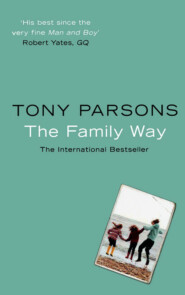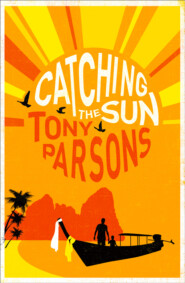По всем вопросам обращайтесь на: info@litportal.ru
(©) 2003-2025.
✖
The Complete Man and Boy Trilogy: Man and Boy, Man and Wife, Men From the Boys
Автор
Год написания книги
2018
Настройки чтения
Размер шрифта
Высота строк
Поля
‘No.’
‘Waitresses get off late.’
‘You like being a waitress? Do you like being a service executive in the catering industry?’
That got a big laugh from all the creeps who thought they looked pretty cool talking about nothing on a mobile phone in the middle of a crowded restaurant.
‘Don’t laugh at me.’
‘I’m not laughing at you.’
‘Long hours, lousy pay. That’s what being a waitress is like. And plenty of assholes. But enough about you.’ She tossed the menu on the table. ‘You think about it for a while.’
The business creep blushed and grinned, trying to butch it out as she walked away. His creepy friends were laughing, but they were not quite as hearty as before.
She came over to me. And I still didn’t know her name.
‘Where’s your boy today?’
‘He’s at nursery school.’ I held out my hand. ‘Harry Silver.’
She looked at me for a moment and then she smiled. I had never seen a smile like it. Her face lit up the room. It just shone.
‘Cyd Mason,’ she said, shaking my hand. It was a very soft handshake. It’s only men who try to break your bones when you shake their hand. It’s only creeps.
‘Pleased to meet you, Harry.’
‘As in Sid Vicious?’
‘As in Cyd Charisse. You probably never even heard of Cyd Charisse, did you?’
‘She danced with Fred Astaire in Paris in Silk Stockings. She had a haircut like the one you’ve got now. What’s that haircut called?’
‘A China chop.’
‘A China chop, is it? Yeah, Cyd Charisse. I know her. She was probably the most beautiful woman in the world.’
‘That’s Cyd.’ She was impressed. I could tell. ‘My mother was crazy about all those old MGM movies.’
I caught a glimpse of her childhood, saw her sitting at the age of ten in front of the TV in some little apartment, the air-con turned up to full blast and her mother getting all choked up as Fred twirled Cyd across the Left Bank. No wonder she had grown up with a warped view of romance. No wonder she had followed some creep to London.
‘Can I tell you about the specials?’ she said.
She was really nice and I felt like talking to her about Houston and MGM musicals and what had happened between her and the man who had brought her to London. Instead I kept my eyes on my pasta and my mouth shut.
Because I didn’t want either of us to start thinking that I was just another creep.
Gina was gone and she was everywhere. The house was full of CDs I would never listen to (sentimental soul music about love lost and found), books I would never read (women struggling to find themselves in a world full of rotten men) and clothes I would never wear (skimpy M&S underwear).
And Japan. Lots of books about Japan. All the classic texts that she had urged me to read – Black Rain, Pink Samurai, Barefoot Gen, Memories of Silk and Straw – and a battered old copy of Snow Country, the one I had actually read, the love story she said I had to read if I was ever going to understand.
Gina’s things, and they chewed up my heart every time I saw them.
They had to go.
I felt bad about throwing it all out, but then if someone leaves you, they really should take their stuff with them. Because every time I saw one of her Luther Vandross records or Margaret Atwood novels or books about Hiroshima, I felt all the choking grief rise up inside me again. And in the end I just couldn’t stand it any more.
Gina, I thought, with her dreams of undying love and hard-won independence, Gina who could happily accommodate Naomi Wolf’s steely, post-feminist thoughts and Whitney Houston’s sweet nothings.
That was my Gina all right.
So I got to work, stuffing everything she had left behind into rubbish sacks. The first one was quickly full – did the woman never throw anything away? – so I went back into the kitchen and got an entire roll of heavy-duty binliners.
When I had finished removing all her paperbacks, the book shelves looked like a mouth full of broken teeth.
Throwing away her clothes was much easier because there was no sorting involved. Soon her side of our wardrobe was empty apart from mothballs and wire coat hangers.
I felt better already.
Starting to sweat hard, I prowled the house mopping up what was left of her presence. There were all the Japanese prints from her single days. A painting she had bought on our holiday to Antigua when Pat was a baby. A pink razor on the edge of the bath. A couple of Gong Li videos. And a photograph of our wedding day with her looking like the most beautiful girl in the world and me grinning like a happy, dopey bastard who never believed he could get so lucky.
All trash now.
Finally, I looked in the laundry basket. Among Pat’s Star Wars pyjamas and my faded Calvins there was the old Gap T-shirt that Gina liked to sleep in. I sat on the bottom of the stairs holding that T-shirt for a while, wondering what she was sleeping in tonight. And then I threw it into the last rubbish sack.
It’s amazing how quickly you can remove the evidence of someone’s life from a house. It takes so long to put your mark on a home, and so little time to wipe it away.
Then I spent another few hours fishing it all out of the rubbish sacks and carefully returning the clothes, the CDs, the books, the prints and everything else to exactly where I had found them.
Because I missed her. I missed her like mad.
And I wanted all her things to be just as she had left them, all ready and waiting for her in case she ever felt like coming back home.
Twelve (#ulink_f16e4781-e410-5629-832c-13b736f0426e)
A bit of a panic attack in the supermarket.
Nothing serious, nothing serious. Just the sudden realisation that a man like me, whose little family had broken into tiny pieces, was daring to do his shopping at the feeding trough of the happy family. I felt like an impostor.
Being surrounded by all the grotesques of aisle eight should have made me feel better – the women with tattoos, the men with earrings, the little children dressed like adults, the adults dressed like adolescents – but they didn’t.
I was shaking and sweating at the checkout, wanting it to be over with, wanting to be out of there, my breath coming in short, shallow gasps, and by the time the semi-comatose teen on the till handed me my change while idly scratching at his nose ring, I felt on the very edge of screaming or weeping or doing both at once.
I burst out of the supermarket into the open air and just at that moment the bag containing dinner for Pat, the cat and me lost its handle, and my shopping haemorrhaged into the street.
Gina’s supermarket bags never broke. We had done our weekly shop together every Saturday for seven years, and I never once saw a carrier bag that she had loaded spring a leak. But maybe Gina didn’t buy as many microwave meals as me. They weigh a ton, those things.
Suddenly there were cat tins and ready-in-one-minute meals everywhere, under the wheels of shopping trolleys, at the feet of a young man selling the Big Issue and skittering towards the road. I was on my hands and knees picking up a box that promised, ‘A Taste Of Tuscany’ when they saw me.











